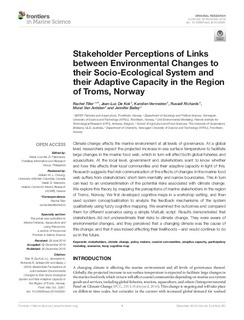| dc.contributor.author | Tiller, Rachel Gjelsvik | |
| dc.contributor.author | de Kok, Jean-Luc | |
| dc.contributor.author | Vermelren, Karolien | |
| dc.contributor.author | Richards, Russell | |
| dc.contributor.author | Ardelan, Murat Van | |
| dc.contributor.author | Bailey, Jennifer L. | |
| dc.date.accessioned | 2019-04-01T09:17:01Z | |
| dc.date.available | 2019-04-01T09:17:01Z | |
| dc.date.created | 2016-12-19T14:01:39Z | |
| dc.date.issued | 2016 | |
| dc.identifier.citation | Frontiers in Marine Science. 2016, 3 . | nb_NO |
| dc.identifier.issn | 2296-7745 | |
| dc.identifier.uri | http://hdl.handle.net/11250/2592647 | |
| dc.description.abstract | Climate change affects the marine environment at all levels of governance. At a global level, researchers expect the projected increase in sea surface temperature to facilitate large changes in the marine food web, which in turn will affect both global fisheries and aquaculture. At the local level, government and stakeholders want to know whether and how this affects their local communities and their adaptive capacity in light of this. Research suggests that risk communication of the effects of changes in the marine food web suffers from stakeholders' short-term mentality and narrow boundaries. This in turn can lead to an underestimation of the potential risks associated with climate change. We explore this theory by mapping the perceptions of marine stakeholders in the region of Troms, Norway. We first developed cognitive maps in a workshop setting, and then used system conceptualization to analyze the feedback mechanisms of the system qualitatively using fuzzy cognitive mapping. We examined the outcomes and compared them for different scenarios using a simple MatLab script. Results demonstrated that stakeholders did not underestimate their risks to climate change. They were aware of environmental changes, and they perceived that a changing climate was the cause of this change, and that it was indeed affecting their livelihoods—and would continue to do so in the future. | nb_NO |
| dc.language.iso | eng | nb_NO |
| dc.publisher | Frontiers Media | nb_NO |
| dc.rights | Navngivelse 4.0 Internasjonal | * |
| dc.rights.uri | http://creativecommons.org/licenses/by/4.0/deed.no | * |
| dc.title | Stakeholder Perceptions of Links between Environmental Changes to their Socio-Ecological System and their Adaptive Capacity in the Region of Troms, Norway | nb_NO |
| dc.type | Journal article | nb_NO |
| dc.type | Peer reviewed | nb_NO |
| dc.description.version | publishedVersion | nb_NO |
| dc.source.pagenumber | 16 | nb_NO |
| dc.source.volume | 3 | nb_NO |
| dc.source.journal | Frontiers in Marine Science | nb_NO |
| dc.identifier.doi | 10.3389/fmars.2016.00267 | |
| dc.identifier.cristin | 1415128 | |
| dc.description.localcode | © 2016 Tiller, De Kok, Vermeiren, Richards, Ardelan and Bailey. This is an open-access article distributed under the terms of the Creative Commons Attribution License (CC BY). The use, distribution or reproduction in other forums is permitted, provided the original author(s) or licensor are credited and that the original publication in this journal is cited, in accordance with accepted academic practice. No use, distribution or reproduction is permitted which does not comply with these terms. | nb_NO |
| cristin.unitcode | 194,67,25,0 | |
| cristin.unitcode | 194,66,25,0 | |
| cristin.unitname | Institutt for sosiologi og statsvitenskap | |
| cristin.unitname | Institutt for kjemi | |
| cristin.ispublished | true | |
| cristin.fulltext | original | |
| cristin.qualitycode | 1 | |

